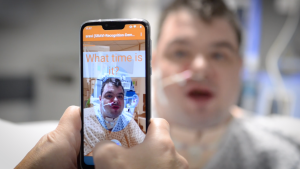Chinese tech giant Tencent is scanning gamers’ faces late at night to prevent children from joining midnight online battles using the false identity of an adult.
Under a new “midnight patrol” scheme launched on Monday, players will likely be asked to have their face scanned if they are playing Tencent’s games, such as Honor of Kings and Game for Peace, from 10 p.m. to 8 a.m., the company said in a statement.
Videos by VICE
All gamers in China are required to register accounts under their real identities, and minors are subject to strict addiction-prevention rules. Gaming giants including Tencent and NetEase have banned minors from playing games late at night, and capped the time they can spend gaming at 1.5 hours on weekdays and three hours on public holidays.
Tencent said the facial checks are aimed at verifying whether late-night players are indeed adults, since some children are able to circumvent the rule by using other people’s accounts. Those who fail to pass the test during the late night and early morning hours will be treated as minors and kicked out of the games, according to Tencent.
The Chinese government is bringing the country’s tech giants under tighter control by imposing massive antitrust fines, stepping up regulations on handling users’ data, and putting apps under national security investigations. One thing the tech companies have been asked to do is to prevent underage users from spending excessive time and money on mobile games, live-streaming sites, and TikTok-style short-video platforms.
In response, social media sites have been identifying underage users using algorithms, and providing them with educational content instead of celebrity gossip. Mobile games, regularly slammed by state media for hurting children’s eyesight and studies, are also stepping up screening minor players.
Tencent has been using facial-recognition technology since 2018 to detect underage users. Gamers registered as adults will be asked to have their face scanned if they behave like minors.
For example, a facial scan is required when a user with a stated age of 60 or above spends more than 1,000 Chinese yuan ($154) on games—it’s likely to be a child using their grandparent’s ID, the thinking goes.
The facial data is then used to verify their identities using a police database.
By June, an average of 5.8 million player accounts were told to go through facial recognition every day, Tencent said.
The late-night facial screening, which will potentially cover more users, has also prompted privacy concerns. Chinese internet users have grown wary about the expanding use of facial recognition technology, although many feel there is little they can do about the ubiquitous data collection by payment apps, COVID-19 control programs, and surveillance cameras.
“Remember to put on your clothes before having the facial scan,” said one of the most liked comments under a post about late-night facial scans. A news report went viral in China recently, warning that in addition to one’s own face, everything else within the front camera’s shot is also recorded in facial recognition systems.
Despite these measures, children have tried and, at times, been able to fool the technology so they could play the games anytime and for as long as they wanted.
“Honor of Kings has been requesting facial recognition for two months. Every time, I asked my parents to help,” a user said on Quora-like Zhihu in April last year. “But my mother is moving to work elsewhere in a few days. What should I do?”
Earlier this year, police in the southern province of Guangdong arrested nine people for making tens of thousands of dollars from helping minors pass facial scans. According to the police, the gang purchased people’s identity information online, and created animations of moving faces with software such as Mug Life, Adobe Premiere, and CrazyTalk 8.
They then altered camera software on Android phones and used the animations to pass the facial scans required by mobile games.
Follow Viola Zhou on Twitter.






